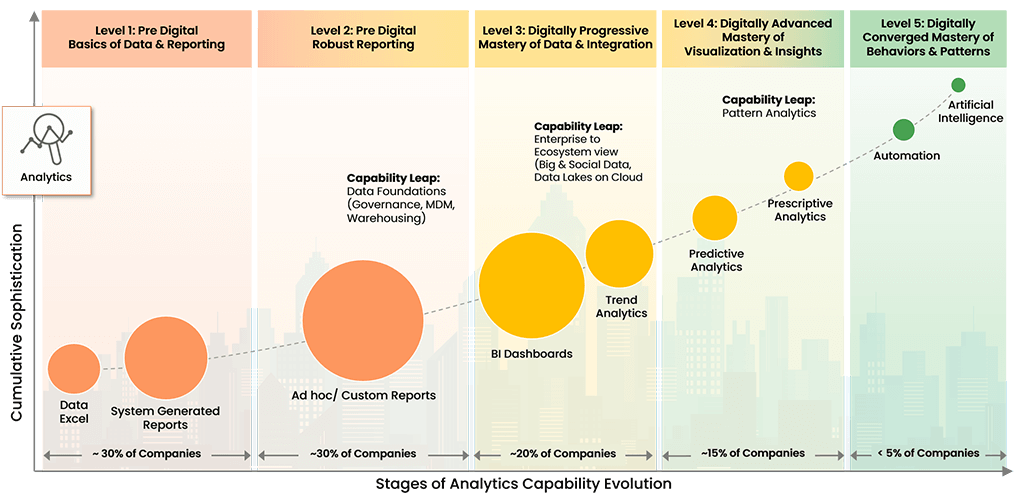Digital-First Competitors Lead the Charge
The consumer products industry is home to numerous companies that were born digital. This makes the
industry a leader in enterprise-level digital transformation, where competition necessitates
continuous . A
combination of private equity and venture capital firms enable angel startups to rapidly develop and
deploy products, making the industry a hotbed for rapid and agile digital innovation.
For legacy companies, falling behind these newcomers is equivalent to failure, with a loss of product
momentum triggering a feedback loop of lost sales, customers, and eventual business decline. All
industry players must be highly aware and sensitive to the transforming competitive landscape,
leveraging technology or data-driven business models and processes to stay ahead of the pack.
Only 7% of Companies Are Delivering on Their Transformational Initiatives
Our research has shown that 30% of companies will fail to survive this decade due to an inability to
evolve digitally. To address this negative trend, we have developed the Digital Enterprise Evolution
Model™ (DEEM).
Digital Enterprise Evolution Model™

Copyright © 2022 Trianz
DEEM allows our clients to recognize digital evolution patterns, implement benchmarking and
prioritization strategies, and initiate application management protocols to satisfy stakeholder and
market requirements.
Reimagining the Customer Value Proposition
The things that customers value most are changing. This calls for the reimagining of the customer value
proposition, analysing new customer sentiment to guide product development decisions. Product life
cycles are shortening due to rapid innovation, and mass migration to digital e-commerce is creating the
ideal environment for disruptors. Additionally, manufacturers are increasingly able to adopt
direct-to-consumer (D2C) sales models, which puts incumbents at risk of losing business.
Digital-first companies use technologies like the cloud, artificial intelligence (AI) and
machine learning
(ML), as well as automation to combat incumbency advantages enjoyed by more established
competitors. They are also adopting high-risk, low-reward operating models to rapidly establish a
customer base and gain market share, before shifting at a later stage to increase profitability.
Therefore, maintaining pace with industry averages is not sufficient. Instead, companies need to
digitalize to remain competitive and retain leadership. This will require the creation of connected
product experiences, and a transformation throughout the value chain and to all stakeholders. In
response, our data shows that 56% of large enterprises are planning a total digital transformation,
reinventing experiences to survive in an increasingly hostile market environment.
Vision-Driven Strategies Leave Little Room for Error
There is little room for error for consumer product companies looking to develop and implement new
digital strategies. For businesses that sit outside the vision-driven quadrant, there is a lack of
urgency to the value of digital transformation. These companies may undergo digital transformation in
certain areas, but sub-optimal execution is holding them back. This highlights the need for a
well-planned, comprehensive digital transformation strategy in all areas of the business.
Half of consumer product companies are planning significant investments in cloud technologies,
transforming the underlying technical foundation to deliver improvements across all business areas. Many
companies also report investing in advanced analytics functionality and robotic process automation
(RPA), raising the bar for efficiency and agility in the digital era. There is still room for
improvement, however, and other businesses must upgrade their own IT operations in similar fashion to
remain competitive.
Research and Development is Raising the Bar for Product Quality
Our research has shown consumer products industry is rapidly catching up in terms of research and
development with the high tech industry. Furthermore, research and development are set to see
significant digitalization investment from consumer product companies in the context of process
automation or optimization and analytical insight generation.
Given the competitive nature of the consumer products industry, it is no surprise that investments in
advanced analytics and process automation outpace all other notable areas. This accentuates the
requirement for vision-driven digitalization among consumer product companies and highlights potential
negative outcomes for vulnerable companies who reside outside the vision-driven quadrant.
Experience the Trianz Difference
Trianz enables digital transformations through effective strategies and excellence in
execution. Collaborating with business and technology leaders, we help formulate and execute
operational strategies to achieve intended business outcomes by bringing the best of
consulting, technology experiences and execution models.
Powered by knowledge, research, and perspectives, we enable clients to transform their
business ecosystems and achieve superior performance by leveraging infrastructure, cloud,
analytics, digital and security paradigms. Reach out to get in touch or learn more.





 >
>













